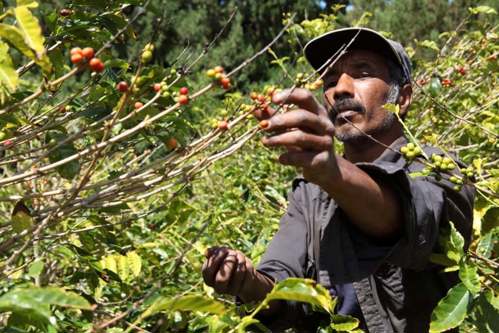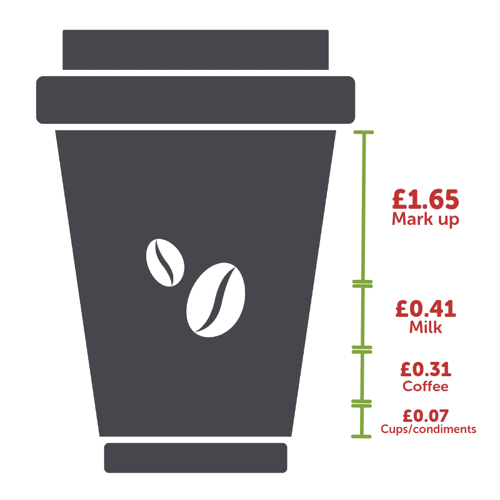How is the coffee crisis going to affect you?
Put down your soothing cup of coffee, because this might alarm you, but yes, your favorite breaktime beverage is under threat. The reason being that the farmers behind your cups of coffee earn less than they need to break even, forcing them away from their crops, which will lead to a lack of supply for us.
The average citizen drinks 676 cups of coffee and spends a total of £303 on coffee each year - and this figure is set to increase by a further 2% annually - which also applies to the global coffee market.
However, despite projected market growth, the world’s coffee market is in crisis – because farmers are being paid too little. As such, they’re abandoning their plantations and getting other jobs or growing crops that pay better.
In this blog post, we’ll explore why coffee may disappear from our shelves and illustrate how you can help.
What is causing the coffee crisis?

A study by the Speciality Coffee Association of America found that 60% of coffee farmers in Guatemala, Nicaragua, El Salvador and Mexico have reported food insecurity during the harvest cycle in recent years. This is an issue that is facing coffee farmers globally.
If we don’t increase the earnings for coffee farmers, they will not plant new crops, meaning that there will be a lack of supply to meet the growing demand.
In addition, the price of coffee dropped to a decade low of £0.70 per pound in May; exacerbating the issue, as coffee farmers need to make £1 per pound of coffee just to break even. The same study by the BBC also found that coffee farmers only receive between 1-2% of the retail profits.
Why are smaller plantations struggling the most?
The Speciality Coffee Association of America also found that falling coffee prices impact smaller farms the most. It’s because it takes between three and four years for a coffee tree to be ready for harvest, meaning that farmers only get a handful of yields each decade.
If the prices of coffee are too low when they sell their crops, smaller plantations can’t afford to wait for the next yield. This is contrary to larger plantations, which have several crops that will sustain them through the price drops.
Countries in Africa are likely to suffer the most, where the market is largely made up of smaller subsistence farms - where yields are low compared to countries such as Vietnam and India.
What are you paying for when you buy a coffee?
By this point you may be wondering how coffee farmers make so little, as buying a brew in the UK isn’t cheap, with the average price for a cup in a café being £2.44. The UK’s coffee price is however relatively cheap compared to other nations such as Norway (Copenhagen), where it costs £5.14 per cup and Switzerland (Zurich), where the average price is £4.10.
So, what are you paying for when you buy a coffee and how much is going to the farmers? We break down the expenses of a £2.44 cup of coffee, below:

How can we save the coffee industry?
In order to tackle this issue, there must be drastic regulatory and ethical changes in the industry. We’ve detailed the most important below:
- Diversifying farmer’s incomes
By diversifying coffee farmers’ incomes, creating additional sources of revenue they will not be entirely dependent on the sale of their coffee to support them; as when farmers sell their beans in a low price market, the sale of their other crops will help to cover their running costs. In addition, teaching farmers risk-management - methods of streamlining their production chains - and how they can mitigate the impacts of climate change on their crops will increase their output and profits.
- Promote drinking coffee in coffee-producing nations
According to the Information Commissioner’s Office, coffee-producing nations often have a low level of coffee consumption, so, by promoting these nations to drink more coffee, farmers will be able to sell directly to the roasters and cafes, saving them money on transportation of the beans overseas.
- Fairer pay from big buyers
Many farmers are calling for larger buyers in the industry such as Nestle to pay fairer prices, as well as supporting smaller plantations rather than just buying from the larger more established growers.
- Pay guarantee
Ethical labels such as FairTrade are working to implement a global minimum price for coffee, that guarantees farmers earn enough to cover the running costs of their farm and pay for their living costs.
By implementing a minimum price, it will act as a safety-net for farmers when the price of coffee falls.
What is being done to help coffee farmers now?

There are already a handful of major coffee firms putting actions in place to help improve their farmer’s profits. Starbucks, for instance, has a $20 million fund to support their suppliers in central America when the coffee prices drop.
Vega Coffee use a more integrated approach in their supply chain. They see that each stage of their coffee production, such as washing, roasting and packaging is done in the country and farms of origin before it is then exported. which found that the farmers that supply Vega Coffee with beans can earn up-most of £4 per pound; quadruple that of the market value. This is due to the cost of production and packaging being cheaper in coffee-growing nations.
Rather than simply paying farmers just enough to break even, Vega Coffee’s approach would see the skills of the farmers diversify, which will increase the value of their product and the price that they can charge to market.
Consumers also play a key role in preventing the coffee crisis – by supporting brands, such as Vega Coffee, who are taking steps to improve the profits of their farmers, you will be helping to improve the profits and lives of their growers.
Join the conversation
Is this the end of our coffee addiction? And what do you think needs to change in the coffee market to prevent it from disappearing from our shelves? Let us know on Twitter and LinkedIn.





